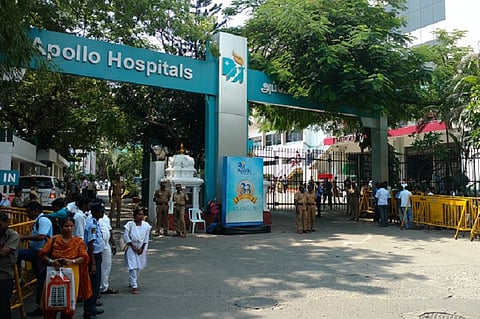

Late on September 22, Tamil Nadu Chief J Jayalalithaa was admitted at Apollo Hospital in Chennai for suffering from fever and dehydration.
Ever since, the state of Tamil Nadu has been subject to large-scale, reckless rumour-mongering, enabled by social media and instant messaging. The secrecy which generally shrouds the life of Jayalalithaa has continued to mask her health condition too, creating a fertile atmosphere for dangerously false information.
On Thursday, the Madras High Court dismissed a petition by serial PIL-filer Traffic Ramaswamy seeking more information on Jayalalithaa’s health and photographic evidence of her in the hospital. The court even described the petitioner as publicity-hungry in asking for such information. The court warned against making this a political issue.
Few days ago, the CM’s political arch rival M Karunanidhi released a statement demanding more information about her health and asked the Tamil Nadu government for photographic evidence of Jayalalithaa in hospital to quash rumours around her health.
This is not an easy debate. No doubt, there are strong political undertones, but we also have to consider Jayalalithaa’s right to privacy regarding her health, and the public’s right to know how capable she is of working since she is a democratically elected leader. In fact, this is a political issue, for the concern here is the CM’s capability to function politically.
There have been several vague statements from Apollo since the CM was admitted, but the rumour-mongering has not stopped. Companies have, on several days in the past few weeks, asked their employees to return home early, while families have been cautious while venturing out.
As such, Apollo and the government also need to bear some responsibility for the rumours. There has not been enough clarity from their side. For instance, one of the statements said that Jayalalithaa was under “respiratory support”. What does this mean, that she was wearing an oxygen-mask? Why mention a simple oxygen mask? If it was a ventilator, then the situation is very serious and she is unlikely to be in a position to take crucial decisions. Then who is standing in as the CM is her absence?
In such a situation, is it really inappropriate for us to seek more clarity on Jayalalithaa’s health?
Legally speaking, Jayalalithaa or the government are not under any compulsion to divulge the details of her health. The code of conduct for ministers does not require such information to be revealed. Under RTI too, it is not mandatory for the government to give out information on her health.
However, if public money is being spent on her treatment, then there is some responsibility on the government to remain transparent. Even so, from a legal standpoint, four statements from Apollo could be seen as just about enough.
She has the right to privacy. We do not have the right to know the most minute details of her health.
But the issue isn’t just about legalities. From a democratic standpoint, citizens have the right to know if an elected leader is up to the job. The political circumstances make it even more compelling for us to know. The CM holds a tight control over the party and the government, and with Jayalalithaa still in hospital, there are bound to be questions of governance and stability, which matter to citizens.
A similar debate is afoot in the US, with the two presidential candidates fighting it over whether private health information is a matter of public interest. In fact, the President of the United States is required to submit a complete medical report every year, which is released to the public.
So, it would be well within the rights of citizens to demand for more clarity. But then, it is also true that public discourse is capable of creating paranoia over regular medical problems, by exaggerating its actual impact on a persons’ administrative capabilities.
The question then is, how much information should be released, especially since there are rumours galore?
This is where the state needs to step in to create specific policy. Amidst an atmosphere of reckless information, what is being sought is not Jayalalithaa’s exact blood glucose levels, but regular updates on her health. We want to know, on record, and possibly with some corroboration, if she is conscious and capable of taking decisions.
Following a medical episode of Israeli PM Ariel Sharon in 2005, a law was proposed, titled “Reporting on the Medical Condition of the Prime Minister.”
According to the Israeli Medical Association, “The proposed law relates to the reporting of any medical episode requiring hospitalization, as well as medical checkups, and the candidate’s health prior to being elected. Regulation of the matter will hopefully prevent a situation where partial, non-specific reports and speculative interpretations and commentary are given regarding the health of a leader. This will help ensure a fair balance of the public’s right to know with an individual’s right to privacy.”
Perhaps a policy similar to this would help us back home in India.
Note: The views expressed here are the personal opinions of the author.